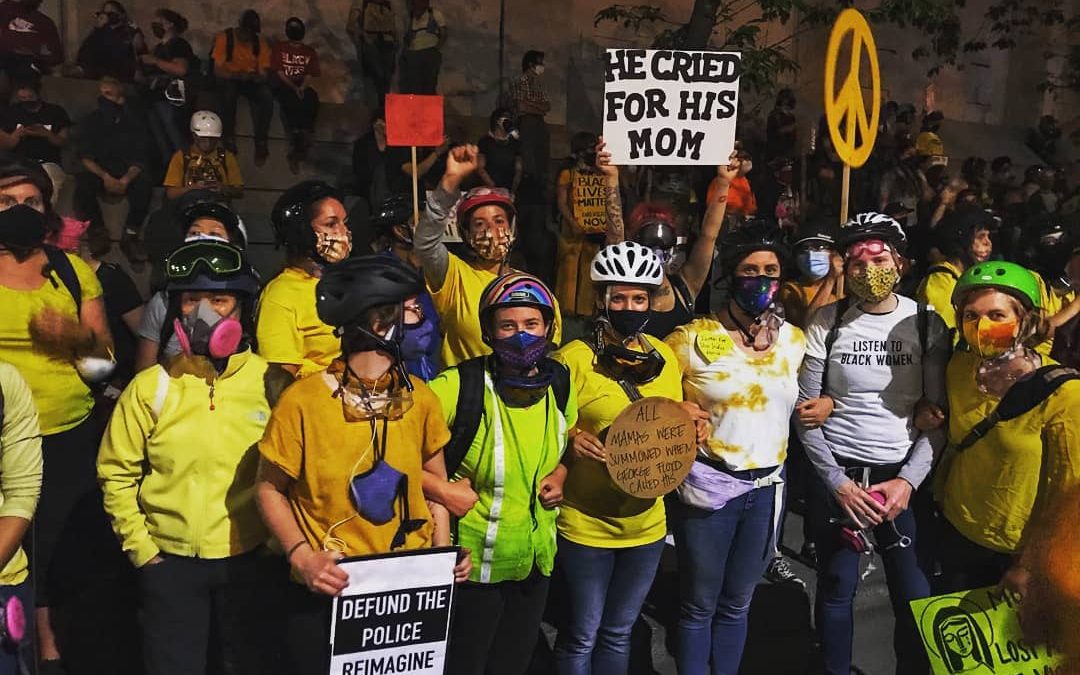My Niece in the WALLOFMOMS, Portland, Oregon, July 22, 2020
All my life, I have learned to do whatever was needed to avoid pain and discomfort. And when distress and pain inevitably found me and disturbed my comfortable life, I figured out how to rapidly rearrange things to return to my comfort zone.
I’m finally beginning to understand that if I don’t choose to get out of my comfort zone, I will miss true learning opportunities.
Understanding this does not make it easy. Undoing nearly a lifetime of habits will probably take the rest of my life.
My guest in this week’s podcast episode, Tom DeWolf, is one of my teachers on the path to becoming comfortable with discomfort. Tom is Program Manager for Coming to the Table, an organization that provides leadership and resources for all who wish to acknowledge and heal wounds from the racism that is rooted in the United States’ history of slavery. The inspiration for the name Coming to the Table was from Dr. Martin Luther King’s, “I Have a Dream” address in which he said, “I have a dream that the sons of former slaves and the sons of former slave owners will join together at the table of brotherhood.”
I love the metaphor of Coming to The Table: Gathering ingredients, finding new recipes, tasting them and eating together, preferably with our hands. There’s something very raw, and communal, and intimate about this. I believe we’re all hungry to be connected in this way.
But Tom explains that sitting around that table will be uncomfortable — for everyone.
In his words, “It’s the hard work of repair, of reparation. It’s going to be painful, and it’s going to involve accountability, and it’s going to involve apology. It’s going to involve baring our souls with each other.”
Tom goes on to say, “If there’s one thing I think we do a really poor job at in this country, it’s dealing with issues of shame, and blame, and guilt. We love heaping it on other people and using it as a weapon rather than using them as opening of doors to explore what it is that I’m feeling guilty for, or ashamed of, or blamed for. And then, I use those things to build my walls, to protect myself from any further woundedness.”
There it is again: Protecting myself from discomfort.
The following is from my niece Kat Bonham, another of my teachers, who was part of the WALLOFMOMS in Portland, Oregon on July 22, 2020, describing her “momentary discomfort:”
“After several hours of a general jovial mood (think chanting, singing, dancing), a few protestors started banging on the federal courthouse. The mood quickly changed. My friends and I donned the goggles and bike helmets that we had brought, and skeptically accepted the ear plugs a passerby offered us. A seasoned protester nearby told us that the feds would show up, sometimes coming out of a door hidden from sight, and that smoke would be the first thing they’d use to try and disperse us. Before I could orient myself, I found myself linking arms with others, and face to face with the federal officers, sent here to bring order to our city. The sight of them caught me off guard, as they were in full riot gear, some carrying assault weapons. As we chanted “stay together, stay tight”, and the majority of the protestors were behind us, the tear gas and flashbangs started coming toward us with no warning. We tried to hold the line and our position the best we could but with burning eyes and lungs, loud explosions coming from any direction, and more officers approaching through the dark and the smoke, it was disorienting, and we stepped out of the way to recover.
My body was shaking, the adrenaline pumping, my brain trying to make sense of what had just happened. We hadn’t done anything wrong. So, why were they treating us as criminals? And then I had the realization that for many Black and Brown folks in our country, that is their experience on a daily basis with the police and otherwise. They haven’t done anything wrong, so why are they being treated as criminals? And then I remembered that staying up past my bedtime, being out here, suffering a momentary discomfort was all with the hope that we can help shape a different futurefor Black folks. A future that would give them the dignity and experience they deserve but has never been afforded them based on history and systems that were created to hold them down.”
Tom DeWolf reminds us that the hard work of repair will inevitably be painful and uncomfortable for all involved — in this case, even the police. Can we all stay in that discomfort long enough to begin to heal?


Any of us who have worked our way through major changes in our organizations or our families know that the process of change is uncomfortable. The place between where we are and where we want to go is typically filled with uncertainty and resistance. However, if we want to live in a healthier society it will require going through this uncomfortable space.